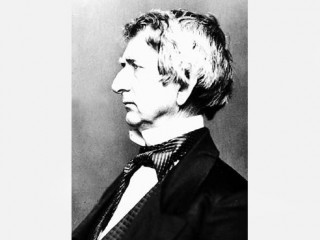
William Seward biography
Date of birth : 1801-05-16
Date of death : 1872-10-10
Birthplace : Florida, New York, U.S.
Nationality : American
Category : Politics
Last modified : 2010-06-04
Credited as : Sectreary of State, Abraham Lincoln,
0 votes so far
William Henry Seward (1801-1872), American statesman, is noted for his staunch opposition to the spread of slavery and for his handling of foreign affairs as a member of Abraham Lincoln's Cabinet during the Civil War.
William H. Seward was born on May 16, 1801, in Florida, N.Y. He attended school there and at the age of fifteen entered Union College. In 1818, after a disagreement with his father over money matters, Seward ran away to Georgia, where he taught school and learned something of the South and slavery. He returned and in 1820 graduated from Union.
Seward then studied law and was admitted to the bar in 1822. He began practice as a junior partner of Judge Elijah Miller in "the bustling village of Auburn." He married the judge's capable daughter, Frances, and success came at once. The rise of the Anti-Masonic party lured him into politics, where he came into contact with master politician Thurlow Weed, who became his political mentor and shrewd guide into public office. Seward was elected state senator in the fall of 1830 as the advocate of internal improvements, sound banking, and social reforms. Following defeat in 1833, he cast his lot with the Whigs.
New York Governor
With Weed's help, Seward became the Whig candidate for governor of New York, and in 1837, when the poor economic situation made those in office look bad, he was elected. As governor for two terms, he attracted wide attention for his battle with Southern governors over the return of fugitive slaves and his efforts to secure equal opportunity for the education of Catholic children in New York. In 1842 he returned home to resume his law practice and to restore his depleted finances.
Seward was not, however, out of the public eye. His position against slavery had given him a leading place in the formation of the new Liberty party. His own idea was to take a firm but moderate course. "Let the world have assurance that we neither risk nor sympathize with convulsive, revolutionary or sanguine measures." He was for compensation to the slaveholder with "regard for his feelings" and for equal compassion "to the slave."
In 1846 two African Americans, both clearly mentally ill, were brought to trial in Auburn on the charge of murder. Seward's eloquent defense of these two "spread his fame far and wide and his Argument in Defense of William Freeman ... went into four editions the same year." William Gladstone called his summation "the finest forensic effort in the English language."
Seward was elected to the U.S. Senate in 1849. Sectional feelings had meantime become intense, and the Mexican War had raised again the issue of slavery in the territories. Seward supported a proviso barring slavery from any territory acquired from Mexico but sharply opposed Henry Clay's compromise bill, which left the slavery issue unsettled. Seward was reelected in 1854, the year Stephen A. Douglas introduced his Kansas-Nebraska Bill and the Republican party was created. He spoke against Douglas's bill but only gradually shifted to the new party.
In Lincoln's Cabinet
With the Republican victory in November 1860, Lincoln quickly chose Seward as secretary of state. Seward accepted with the assumption that responsibility for conducting the administration rested on his shoulders. He would assume the role of "prime minister" for a president who was inferior in experience and abilities to himself. Though he soon learned better, only the modesty and wisdom of a Lincoln would have endured Seward's unsolicited advice and his independent course in dealing with Southern matters. When he finally discovered that a conciliatory attitude and a willingness to leave slavery to each state was not enough to preserve the Union, Seward became one of Lincoln's most loyal defenders and, in the end, one of the nation's greatest secretaries of state.
Although Seward's conduct during the period that the Southern states began seceding from the Union is open to serious criticism, his handling of foreign affairs deserves the highest praise. While the North rejoiced at the seizure of two Confederate agents on board the British ship Trent, Seward wisely accepted England's protest and returned the men. He handled the matter of English and French recognition of the Confederacy with such dignity and firmness that neither took official action. His pressure, coupled with a veiled threat of dangerous consequences, caused British officials to "take due precautions" in outfitting Confederate privateers.
Seward urged Lincoln to run again in 1864. Seward was connected so closely with all that Lincoln represented that an attempt was made on his life the same night the President was assassinated. Seward remained in the Cabinet after Lincoln's death and supported President Andrew Johnson's efforts to bring the Southern states back into the Union. He remained loyal even when impeachment proceedings were brought against the President.
Seward rounded out his diplomatic career by crowding France and Maximilian out of Mexico, settling the Alabama Claims, and purchasing Alaska from Russia. He spent his last days traveling, ending with a trip around the world. He died at his home in Auburn, N.Y., on Oct. 10, 1872.
















